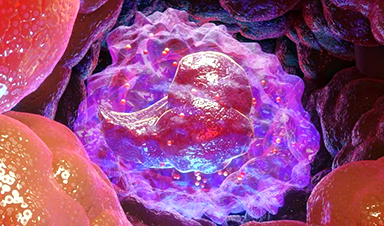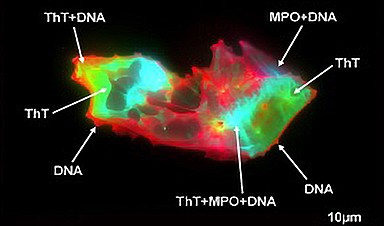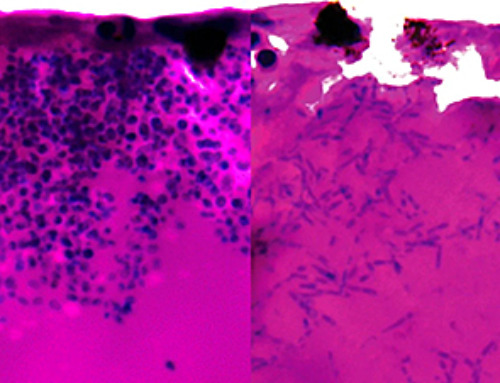When babies in the African countries of Guinea Bissau and Uganda were given the tuberculosis vaccine, something remarkable happened.
Instead of the vaccine only protecting against the target bacteria – Myocbacterium tuberculosis – the tuberculosis vaccine offered broad protection against a range of unrelated infections, including respiratory infections and serious complications such as sepsis.
The team administered the Bacille Calmette-Guérin (BCG) vaccine to 63 infants within ten days of their birth and compared their progress to a control group of 67 infants who did not receive the BCG vaccine.
The researchers took blood samples from the infants and examined circulating white blood cells called monocytes in both groups.
Monocytes are part of the human body’s innate immune system, which provides the first line of defense against pathogens and is not specific to any one disease.
Looking at these monocytes, researchers found distinct epigenetic differences – changes to the way genes are expressed or control which genes are active and which are switched off – between the vaccinated group and the unvaccinated group that lasted on average around 14 months after vaccination.
In vaccinated babies, the BCG vaccine reprogrammed or ‘trained’ monocytes to be more responsive to pathogens in general, and this epigenetic signature was passed down to the next generation of monocytes for more than a year after vaccination.
“For the first time, we have shown how the BCG vaccine can have long-lasting effects on the immune system of infants,” says Boris Novakovic, senior author and molecular biologist at the Murdoch Children’s Research Institute (MCRI) in Melbourne, Australia.
The researchers also used an in vitro experiment to explore these epigenetic changes in detail.
They isolated monocytes from healthy adults and exposed the cells to two types of the BCG vaccine and detected distinct changes in different types of epigenetic modifications.
These included DNA methylation – molecular tags adoring the DNA sequence – and histones – bulky proteins around which DNA strands are wound.
Monocytes respond to pathogens using receptors on the cell’s outside surface.
When these receptors contact a pathogen, it triggers the monocyte cell to ‘eat’ the pathogen (phagocytosis), which also causes a cascade of events inside the cell where one protein switches on another protein and so on, until this triggers a change in the gene expression of the cell.
Putting monocytes on high alert makes them more responsive to all infections, not just tuberculosis.
It was previously thought that the innate immune system had no way of remembering previous infections, unlike the adaptive immune system (which uses T cells and specific antibodies to remember the pathogens it has encountered before).
Over the last decade, scientists have discovered that the innate immune system can actually produce a non-specific memory, called ‘trained immunity’.
“That’s been the breakthrough,” Novakovic told ScienceAlert.
It’s not just the BCG vaccine that makes the innate immune system hyperresponsive. Other live attenuated vaccines that use a weakened form of the virus to protect against diseases such as polio, measles, and smallpox have a similar effect.
Conditions that put stress on the body, such as obesity and high cholesterol, or injuries, also make the innate immune system more responsive. That’s not always a good thing.
In countries where infant mortality is high, vaccinating against tuberculosis, measles, or smallpox may have a beneficial effect in protecting infants against a range of other infections.
In an Australian context where babies rarely die of infectious diseases, there is greater interest in the potential use of the BCG vaccine to prevent allergies and eczema in kids, Novakovic said.
The thinking is that the BCG vaccine may have a beneficial effect on the developing immune system.
A study from MCRI researchers published in Allergy last year found that BCG vaccination had a modest beneficial effect in preventing eczema in infants predisposed to developing the common skin condition.
The epigenetics study was published in Science Advances
News
AI Helped Scientists Stop a Virus With One Tiny Change
Using AI, researchers identified one tiny molecular interaction that viruses need to infect cells. Disrupting it stopped the virus before infection could begin. Washington State University scientists have uncovered a method to interfere with a key [...]
Deadly Hospital Fungus May Finally Have a Weakness
A deadly, drug-resistant hospital fungus may finally have a weakness—and scientists think they’ve found it. Researchers have identified a genetic process that could open the door to new treatments for a dangerous fungal infection [...]
Fever-Proof Bird Flu Variant Could Fuel the Next Pandemic
Bird flu viruses present a significant risk to humans because they can continue replicating at temperatures higher than a typical fever. Fever is one of the body’s main tools for slowing or stopping viral [...]
What could the future of nanoscience look like?
Society has a lot to thank for nanoscience. From improved health monitoring to reducing the size of electronics, scientists’ ability to delve deeper and better understand chemistry at the nanoscale has opened up numerous [...]
Scientists Melt Cancer’s Hidden “Power Hubs” and Stop Tumor Growth
Researchers discovered that in a rare kidney cancer, RNA builds droplet-like hubs that act as growth control centers inside tumor cells. By engineering a molecular switch to dissolve these hubs, they were able to halt cancer [...]
Platelet-inspired nanoparticles could improve treatment of inflammatory diseases
Scientists have developed platelet-inspired nanoparticles that deliver anti-inflammatory drugs directly to brain-computer interface implants, doubling their effectiveness. Scientists have found a way to improve the performance of brain-computer interface (BCI) electrodes by delivering anti-inflammatory drugs directly [...]
After 150 years, a new chapter in cancer therapy is finally beginning
For decades, researchers have been looking for ways to destroy cancer cells in a targeted manner without further weakening the body. But for many patients whose immune system is severely impaired by chemotherapy or radiation, [...]
Older chemical libraries show promise for fighting resistant strains of COVID-19 virus
SARS‑CoV‑2, the virus that causes COVID-19, continues to mutate, with some newer strains becoming less responsive to current antiviral treatments like Paxlovid. Now, University of California San Diego scientists and an international team of [...]
Lower doses of immunotherapy for skin cancer give better results, study suggests
According to a new study, lower doses of approved immunotherapy for malignant melanoma can give better results against tumors, while reducing side effects. This is reported by researchers at Karolinska Institutet in the Journal of the National [...]
Researchers highlight five pathways through which microplastics can harm the brain
Microplastics could be fueling neurodegenerative diseases like Alzheimer's and Parkinson's, with a new study highlighting five ways microplastics can trigger inflammation and damage in the brain. More than 57 million people live with dementia, [...]
Tiny Metal Nanodots Obliterate Cancer Cells While Largely Sparing Healthy Tissue
Scientists have developed tiny metal-oxide particles that push cancer cells past their stress limits while sparing healthy tissue. An international team led by RMIT University has developed tiny particles called nanodots, crafted from a metallic compound, [...]
Gold Nanoclusters Could Supercharge Quantum Computers
Researchers found that gold “super atoms” can behave like the atoms in top-tier quantum systems—only far easier to scale. These tiny clusters can be customized at the molecular level, offering a powerful, tunable foundation [...]
A single shot of HPV vaccine may be enough to fight cervical cancer, study finds
WASHINGTON -- A single HPV vaccination appears just as effective as two doses at preventing the viral infection that causes cervical cancer, researchers reported Wednesday. HPV, or human papillomavirus, is very common and spread [...]
New technique overcomes technological barrier in 3D brain imaging
Scientists at the Swiss Light Source SLS have succeeded in mapping a piece of brain tissue in 3D at unprecedented resolution using X-rays, non-destructively. The breakthrough overcomes a long-standing technological barrier that had limited [...]
Scientists Uncover Hidden Blood Pattern in Long COVID
Researchers found persistent microclot and NET structures in Long COVID blood that may explain long-lasting symptoms. Researchers examining Long COVID have identified a structural connection between circulating microclots and neutrophil extracellular traps (NETs). The [...]
This Cellular Trick Helps Cancer Spread, but Could Also Stop It
Groups of normal cbiells can sense far into their surroundings, helping explain cancer cell migration. Understanding this ability could lead to new ways to limit tumor spread. The tale of the princess and the [...]





















